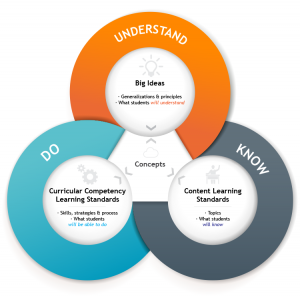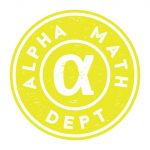
The Mathematics curriculum in British Columbia, along with the curriculum in all subject areas has been redesigned based on a “Know-Do-Understand” model to support a concept-based competency-driven approach to learning.
Three elements, the Content (Know), Curricular Competencies (Do), and Big Ideas (Understand) all work together to support deeper learning. For a more comprehensive overview of the redesigned curriculum click HERE.

Curricular Competencies
The curricular competencies in mathematics are very similar across all grade levels. They state that students are expected to do the following:
Reasoning and Analyzing/Modelling
• Develop thinking strategies to solve puzzles and play games
• Explore, analyze, and apply mathematical ideas using reason,
technology, and other tools
• Estimate reasonably and demonstrate fluent, flexible, and strategic
thinking about number
• Model with mathematics in situational contexts
• Think creatively and with curiosity and wonder when
exploring problems
Understanding and Solving
• Develop, demonstrate, and apply conceptual understanding of
mathematical ideas through play, story, inquiry, and problem solving
• Visualize to explore and illustrate mathematical concepts
and relationships
• Apply flexible and strategic approaches to solve problems
• Solve problems with persistence and a positive disposition
• Engage in problem-solving experiences connected with place, story,
cultural practices, and perspectives relevant to local First Peoples
communities, the local community, and other cultures
Communicating and Representing
• Explain and justify mathematical ideas and decisions in many ways
• Represent mathematical ideas in concrete, pictorial, and symbolic forms
• Use mathematical vocabulary and language to contribute to discussions
in the classroom
• Take risks when offering ideas in classroom discourse
Connecting and Reflecting
• Reflect on mathematical thinking
• Connect mathematical concepts with each other, other areas,
and personal interests
• Use mistakes as opportunities to advance learning
• Incorporate First Peoples worldviews, perspectives, knowledge,
and practices to make connections with mathematical concepts
Content & Big Ideas
The content and big ideas differ for each course. For more detailed descriptions on the content elaborations and big ideas, click below on the course you would like to explore.
